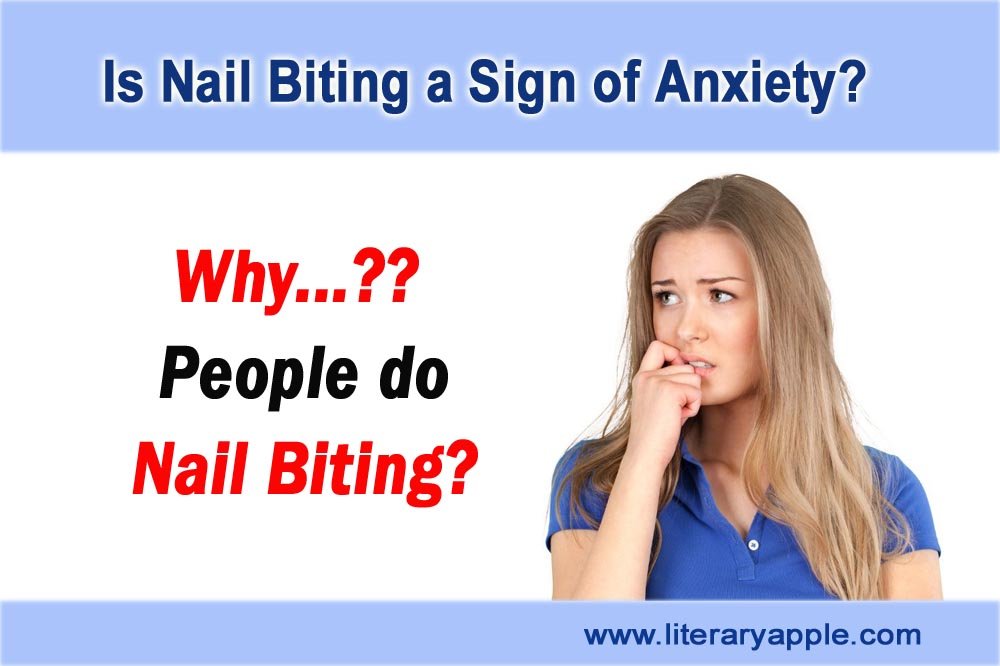Is Nail Biting a Sign of Anxiety? | Exploring Onychophagia

Who People do Nail Biting?
Nail biting, medically known as onychophagia, is a common habit that many people struggle with. It involves biting the nails, often to the point of damaging the nail bed and surrounding skin. While nail biting can be attributed to various reasons, one question that often arises is whether it’s a sign of anxiety. In this article, we’ll explore the connection between nail biting and anxiety, why people do nail biting, and will provide helpful tips to stop nail biting.
What is Nail Biting?
Nail biting or onychophagia is an oral compulsive habit that involves biting the nails and sometimes the surrounding skin. It’s often considered a form of self-grooming but can escalate into a more serious habit.
Who People do Nail Biting?
Nail biting can be triggered by a range of factors, from emotional responses to genetic predispositions. It’s essential to recognize that nail biting can be a complex behavior with multiple underlying causes. Here are some common reasons why people do nail biting.
Stress and Anxiety: Stress and anxiety are among the most common reasons people bite their nails. Nail biting can provide a temporary release of tension and serve as a coping mechanism when facing overwhelming emotions.
Nervousness and Restlessness: Nail biting often surfaces when a person is feeling nervous or restless. It’s not uncommon for individuals to find themselves biting their nails during situations that provoke anxiety, such as public speaking, job interviews, or even social interactions.
Boredom and Inactivity: In moments of boredom or when engaged in tasks that don’t require full attention, people may unconsciously turn to nail biting as a way to pass the time.
Perfectionism and Attention to Detail: Individuals with a perfectionistic streak might be prone to nail biting. The act of biting nails can arise from a desire for symmetry or uniformity, especially if irregularities in the nails trigger discomfort or distress.
Imitation and Social Influences: Children and adolescents often pick up habits from observing their peers or family members. If they see someone around them engaging in nail biting, they might subconsciously imitate the behavior without fully understanding its implications.
Genetic Predisposition: Genetics could play a role in nail biting tendencies. If a family member has a history of nail biting, there might be a genetic link that predisposes an individual to develop the habit.
Sensory Stimulation: Biting nails can provide sensory stimulation, especially for individuals who find oral sensations comforting. This can be particularly true for those who have other sensory processing traits.
Habituation and Routine: Sometimes, nail biting begins as a simple habit and evolves into a routine that is hard to break. The repetitive nature of the behavior can lead to automatic nail biting without conscious thought.
Lack of Awareness: Nail biting can become so ingrained in an individual’s routine that they might not even realize when they’re doing it. It can happen subconsciously, making it challenging to address without active self-awareness.
Emotion Regulation: Biting nails might be an attempt to regulate emotions. The mild pain or discomfort caused by nail biting can trigger the release of endorphins, providing a brief sense of relief from negative emotions.
Is Nail Biting like Other Habits?
Nail biting might share similarities with other habits like skin picking or hair pulling, known as body-focused repetitive behaviors. These habits can be associated with anxiety disorders, but each requires a specific approach to management.
At What Age, People do Nail Biting?
Nail biting is prevalent across various age groups, with studies suggesting that it’s more common in children and teenagers. However, it can persist into adulthood. It affects both genders equally and can be triggered by stress, boredom, or nervousness.
How Nail Biting Is Linked to Anxiety
Nail biting can indeed be a sign of anxiety, but it’s crucial to avoid assuming that all nail biters are anxious. It’s one of many indicators of anxiety and should be considered alongside other behavioral and emotional signs.
Nail biting can also result from habituation, genetic predisposition, or environmental influences. Some individuals may develop the habit during childhood as a way to cope with stress, and it might persist as a conditioned response.
It’s essential to avoid oversimplification. Nail biting can be a reaction to various factors, and anxiety is just one of them. Jumping to conclusions based solely on nail biting can overlook other underlying issues.
Anxiety Management
Understanding anxiety’s broader symptoms, such as excessive worrying, restlessness, and irritability, can help identify whether nail biting is tied to anxiety. Consulting a mental health professional is advisable for accurate assessment.
If nail biting is causing distress or physical harm, consulting a therapist or counselor can be beneficial. Cognitive-behavioral therapy (CBT) and other therapeutic approaches can help address the underlying anxiety triggers.
Strategies to Stop Nail Biting
Practicing mindfulness can redirect the urge to bite nails by promoting self-awareness. Techniques like deep breathing and meditation can help manage anxiety and reduce the impulse to bite.
Replacing nail biting with alternatives like using stress balls or fidget toys can help redirect the compulsion. Engaging in activities that keep the hands occupied can reduce the likelihood of nail biting.
Having a support system can significantly aid in managing nail biting linked to anxiety. Friends and family can provide encouragement and remind individuals to stay mindful of their habit.
Joining support groups, either online or in-person, can connect individuals facing similar challenges. Sharing experiences and learning from others can be empowering and motivating.
Adopting a balanced lifestyle that includes regular exercise, proper sleep, and a nutritious diet can contribute to overall well-being. Physical health is interconnected with mental health.
Engaging in stress-relieving activities like yoga, journaling, or spending time in nature can help manage anxiety levels. Reduced stress can lead to a decreased urge to bite nails.
Impact on Nail and Dental Health
Frequent nail biting can lead to damaged nail beds, infections, and even bleeding. It’s essential to address the habit to prevent these physical complications.
Nail biting can also harm teeth, leading to enamel wear and potential misalignment. Dental professionals can provide guidance on maintaining oral health and minimizing dental issues.
Conclusion
In conclusion, nail biting or onychophagia can indeed be a sign of anxiety, but it’s essential to consider various factors before jumping to conclusions. Anxiety is one of several potential triggers for this habit, and a comprehensive approach to understanding and managing it is crucial. By recognizing the psychological and physical aspects of nail biting, individuals can take proactive steps to address the habit and any underlying anxiety. Remember, seeking professional help and building a support system are key components of successfully overcoming nail biting tendencies.
FAQs
Is nail biting more common in children?
Yes, nail biting is often more prevalent in children and teenagers.
Can nail biting lead to infections?
Yes, frequent nail biting can damage the nail bed and lead to infections.
Is nail biting associated with other mental health disorders?
Nail biting might be linked to other conditions like obsessive-compulsive disorder (OCD) but isn’t exclusive to them.
Can stress balls completely replace nail biting?
While stress balls can help, a comprehensive approach involving mindfulness and habit-reversal training is more effective.
You Might be Interested In…
- Yoga for Migraine | Heal Headache
- Remove Ring from Swellen Finger
- Why You Should Avoid an Apple at Night?
- Lack of Sleep and Premature Skin Aging
- How Much Sleep Do You Need
- Why Do My Socks Smell So Bad? Sweaty Feet
- What You Should Know About Chewing Gum?
- Never Skip Your Breakfast!
- Is Honey Beneficial for Cough?


You May Also Like

Health Benefits of Cranberry Juice
30/05/2023
Is There Any Connection Between Sugar Intake and Belly Fat?
25/02/2024